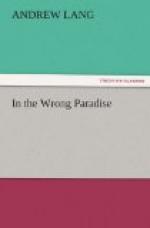“You were complaining,” I remarked, “of something like aphasia?”
“I was,” he replied. “You know what aphasia is in the human subject? A paralysis of certain nervous centres, which prevents the patient, though perfectly sane, from getting at the words which he intends to use, and forces others upon him. He may wish to observe that it is a fine morning, and may discover that his idea has taken the form of an observation about the Roman Calendar under the Emperor Justinian. That is aphasia, and we suffer from what, I presume, is a spiritual modification of that disorder.”
“Yet to-night,” I responded, “you are speaking like a printed book.”
“To-night,” said the spectre, acknowledging the compliment with a bow, “the conditions are peculiarly favourable.”
“Not to me,” I thought, with a sigh.
“And I am able to manifest myself with unusual clearness.”
“Then you are not always in such form as I am privileged to find you in?” I inquired.
“By no means,” replied the spectre. “Sometimes I cannot appear worth a cent. Often I am invisible to the naked eye, and even quite indiscernible by any of the senses. Sometimes I can only rap on the table, or send a cold wind over a visitor’s face, or at most pull off his bedclothes (like the spirit which appeared to Caligula, and is mentioned by Suetonius) and utter hollow groans.”
“That’s exactly what you did,” I said, “when you wakened me. I thought I should have died.”
“I can’t say how distressed I am,” answered the spectre. “It is just an instance of what I was trying to explain. We don’t know how we are going to manifest ourselves.”
“Don’t apologize,” I replied, “for a constitutional peculiarity. To what do you attribute your success to night?”
“Partly to your extremely receptive condition, partly to the whisky you took in the smoking-room, but chiefly to the magnetic environment.”
“Then you do not suffer at all from aphasia just now?”
“Not a touch of it at this moment, thank you; but, as a rule, we all do suffer horribly. This accounts for everything that you embodied spirits find remarkable and enigmatic in our conduct. We mean something, straight enough; but our failure is in expression. Just think how often you go wrong yourselves, though your spirits have a brain to play on, like the musician with a piano. Now we have to do as well as we can without any such mechanical advantage as a brain of cellular tissue”—here he suddenly took the form of a white lady with a black sack over her head, and disappeared in the wainscot.
“Excuse me,” he said a moment afterwards, quite in his ordinary voice, “I had a touch of it, I fancy. I lost the thread of my argument, and am dimly conscious of having expressed myself in some unusual and more or less incoherent fashion. I hope it was nothing at all vulgar or distressing?”




